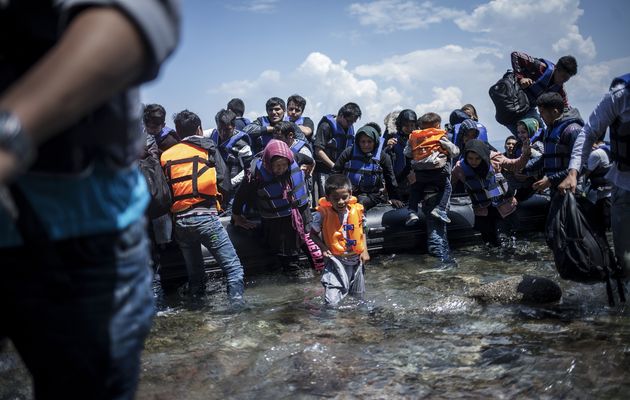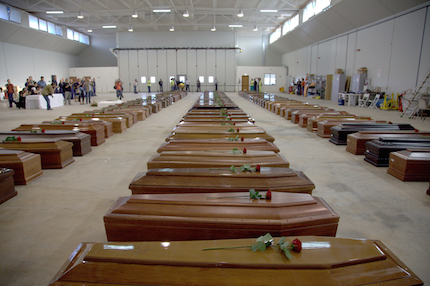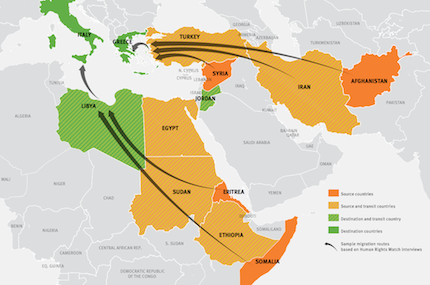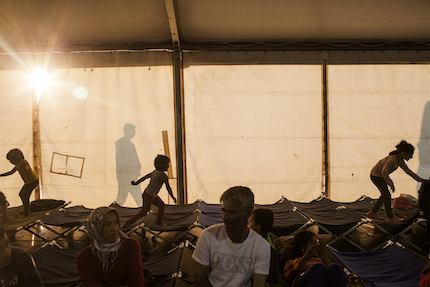“Refugees are desperate and try to go to countries where they believe Human Rights are respected”, said UNHRC spokesperson María Jesús Vega in a interview. Summer will be a very critical season.
 Refugees reach coast after beeing rescued. / UNHCR.
Refugees reach coast after beeing rescued. / UNHCR.
Hundreds of people arrive in the Mediterranean coasts every day, especially in Greece and Italy. The Mediterranean crisis is a reality that, after analysing its figures in the first 6 months of the year, has concerned many organisations.
One of those is the United Nations High Commissioner for Refugees (UNHRC), which published a report recently explaining how Europe is going through a maritime refugee crisis of historic proportions.
Protestante Digital talked to María Jesús Vega, spokesperson of UNHRC in Spain. She explained how the organisation expects that many will risk their lives this summer to come to the European coasts.
It is urgent, she argued, that European governments start applying the plan Brussels introduced last May.
Q. Is the number of people coming to Europe these months significant?
A. The numbers have multiplied exponentially. We have not seen those numbers in years. Last year, 219.000 people arrived in Europe. In the first six month of this year, we have received 137.000, mainly in Greece and Italy.
Now, we are concerned to see ehat is the strongest route now. Many go from Turkey to Greece, and from there to Macedonia, Serbia and Hungary,many are arriving lately through this route.
I am sure this summer, until September or October, we will see a rise in the people who embark in these deadly journeys. Last year, around 3,500 died, and this year there are more than 1,800 already.
 Coffins in Lampedusa. / UNHCR - Francesco Malavolta
Coffins in Lampedusa. / UNHCR - Francesco Malavolta The majority flee from persecution. They are refugees, looking for safe countries that they cannot reach by legal ways, because all the doors have been closed for them. They have called the consulates, they have gone to embassies to try to get visas, but nobody has received them.
They are desperate and try to go to countries where they believe Human rights are respected. Although many are discouraged when they arrive in a different place, they still have the idea of a safe new beginning.
Q. Which is the profile of the people arriving to European coasts?
A. They mainly come from Afghanistan, Syria, Ethiopia, Somalia, Nigeria, and Iraq, usually by boat, and especially to Greece and Italy. They come from countries in conflict, where the human rights are constantly violated, and they suffer persecution.
They have gone through thousands of kilometres, after living in hell, and very often they have to run a steeplechase to reach their goals.
Among them, there are children, women, old people, and minors without their parents. Some are embarked in the boat by their parents, who couldn’t pay the mafia for the whole family, and they are more exposed to be exploited.
There are all kind of people, from different religious and ethnic backgrounds. All have in common the desire of living out of the bombs and the persecution, and all of them say they want to come to Europe.
But when they arrive, for instance, in Greece, they realise that living conditions there are very hard. They sleep outside. This is why we have reinforced our activity on the Greek islands, with tents and humanitarian help packages.
 Refugees route. / HRW - UNHCR
Refugees route. / HRW - UNHCRSome try to go the interior of the country, and because the police does not have enough capacity to stop them all, many are entering the cities by ferry.
Q. What political response can Europe give to all of this?
A. It is a difficult situation. The EU should respond as a whole. It is not a problem of Greece or Italy, but everybody´s problem. The Migration Agenda presented in May, must be taken into account by the countries, to carry out policies which reinforce people´s security.
Q. But that document has been criticised by many countries. Is there a lack of political will to face this crisis?
A. This is controversial. It is sad to see that they do not agree on such small quotas, because we are talking about 20,000 of settlement and 40,000 of resettlement. For those who are in Greece and Italy, who need international protection. They are debating about the lives of people who are completely defencelessness.
The 86 per cent of the refugees are in countries which border with countries in conflict. Syria, Turkey, Jordan, Lebanon and Iraq are the ones that have admitted the 96 per cent: 4 million of Syrian refuges.
This collapse, caused because the international aid has not been enough and some have been waiting 3 years as refugees, has forced many to continue their escape. They cannot live like that and they do not have any security.
 Kids playing in a tent in Italy. / UNHCR - Fabio Bucciarelli
Kids playing in a tent in Italy. / UNHCR - Fabio BucciarelliThe EU is not responding as it should. In 2014, there have been 6.000 petitions of asylum in Spain, 170.000 in Germany, 70.000 in Sweden, and 60.000 in France and Italy.
But we should put those figures in its context. It is a refugee crisis, and that is the way it should be tackled. The EU countries have the moral, political and legal obligation of protect those who flee form persecution, because they signed the 1951 Refugee Convention.

Las opiniones vertidas por nuestros colaboradores se realizan a nivel personal, pudiendo coincidir o no con la postura de la dirección de Protestante Digital.
Si quieres comentar o